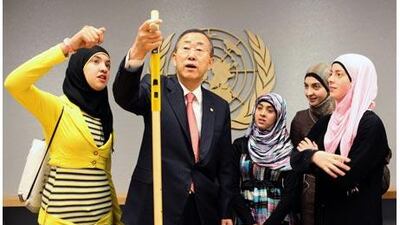NEW YORK // Three Palestinian schoolgirls won praise from the UN secretary general, Ban Ki-moon, when he hailed their innovative beeping walking stick for the visually impaired as a Middle East success story.
The UN leader was testing the walking stick that alerts blind users to stairwells and obstacles. "I'm very impressed by your brilliant idea," the South Korean diplomat told the three teenagers, who are from the West Bank town of Nablus. "This is a Middle East story of brainpower, not firepower. Not only are you helping blind people find the way, I think you are helping the world to see." The three 14-year-olds, Aseel Abu Aleil, Aseel Alshaar and Noor Alarada, were returning to Nablus after winning US$750 (Dh2,750) for their entry into the Intel International Science and Engineering Fair, held in Costa Rica.
Their electronic "sensor cane" for the blind uses infrared sensors to detect nearby walls and obstacles and - in an improvement to existing models - has a downward-pointing sensor to warn of pot-holes and stairwells. "The idea of the stick came to us from watching blind people in our community, where they have lots of difficulty because the roads in our refugee camps have many obstacles and holes," said Ms Alshaar, describing streets around Askar Basic Girls School. "We wanted to help them by developing the stick."
The UN agency for Palestinian welfare, UNRWA, which runs the school and Askar Camp, has trumpeted the project as a triumph for the schoolgirl trio in the face of adversity, restrictions and crisis in education funding. When building prototypes for the cane, the young engineers had to make several journeys through Israeli checkpoints to scour the electrical stores of Ramallah for key components. Their recent international travel was equally fraught. Their accompanying science teacher, Jamileh Khalid described "bad treatment" from customs officials, whose prolonged searches of the vibrating cane led to missed flights.
Ms Khalid said the $200 cost of making the prototype would be significantly reduced were the canes to enter mass production. UNRWA officials have contacted potential Gulf investors to raise money to cover patenting costs and devise a business and manufacturing plan. Chris Gunness, a spokesman for UNRWA, said the teens were the "Albert Einsteins of the future", but warned that the UN agency's school system that produced them was threatened by an annual funding shortfall of US$90 million".
"Let all the high-powered peace-makers take note of these individual contributions as real-life human examples of what can be achieved if the refugees, some of the most disadvantaged, are included and empowered," he said. "In a region like the Middle East, where firepower tends to be used more than brainpower, they are proof that resolving problems rationally through creative interaction is a major contribution to peace."
@Email:jreinl@thenational.ae


